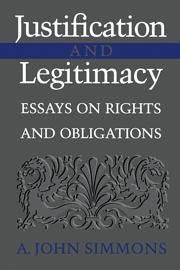Book contents
- Frontmatter
- Contents
- Introduction
- Acknowledgments
- 1 The Principle of Fair Play
- 2 Fair Play and Political Obligation: Twenty Years Later
- 3 The Obligations of Citizens and the Justification of Conscription
- 4 Associative Political Obligations
- 5 External Justifications and Institutional Roles
- 6 Philosophical Anarchism
- 7 Justification and Legitimacy
- 8 “Denisons” and “Aliens”: Locke's Problem of Political Consent
- 9 Human Rights and World Citizenship: The Universality of Human Rights in Kant and Locke
- 10 Original-Acquisition Justifications of Private Property
- 11 Historical Rights and Fair Shares
- 12 Makers' Rights
- Index
2 - Fair Play and Political Obligation: Twenty Years Later
Published online by Cambridge University Press: 05 June 2012
- Frontmatter
- Contents
- Introduction
- Acknowledgments
- 1 The Principle of Fair Play
- 2 Fair Play and Political Obligation: Twenty Years Later
- 3 The Obligations of Citizens and the Justification of Conscription
- 4 Associative Political Obligations
- 5 External Justifications and Institutional Roles
- 6 Philosophical Anarchism
- 7 Justification and Legitimacy
- 8 “Denisons” and “Aliens”: Locke's Problem of Political Consent
- 9 Human Rights and World Citizenship: The Universality of Human Rights in Kant and Locke
- 10 Original-Acquisition Justifications of Private Property
- 11 Historical Rights and Fair Shares
- 12 Makers' Rights
- Index
Summary
My 1979 essay “The Principle of Fair Play” had two principal objectives. The first was to defend the principle of fair play (against critics like Nozick) as a valid principle of moral obligation, a principle not reducible to or deriveble from some more basic or fundamental principle of obligation. The essay's second objective was to refute accounts of political obligation (like those of Hart and the early Rawls) that centrally employed that principle.
My general strategy in support of the former aim was to delineate a plausible version of the principle of fair play (or “principle of fairness,” as it is more commonly called today) that could be collapsed into or ultimately reduced to neither a principle of consent nor some nonvoluntarist principle of morally obligatory reciprocation for benefits received (such as a principle of gratitude). Defending a voluntarist version of the principle allowed me both to remain true to Hart's and Rawls' original goal – that of “introducing” a principle that could capture some of the voluntarist force of traditional contract theory's account of political obligation, without embracing contract theory's “fictions” or anarchistic implications – and to defend a principle that seemed to me far more plausible than any version of it which would allow the mere receipt of benefits from a cooperative scheme to obligate beneficiaries to reciprocate (against which version Nozick's arguments appear to tell so forcefully).
- Type
- Chapter
- Information
- Justification and LegitimacyEssays on Rights and Obligations, pp. 27 - 42Publisher: Cambridge University PressPrint publication year: 2000



